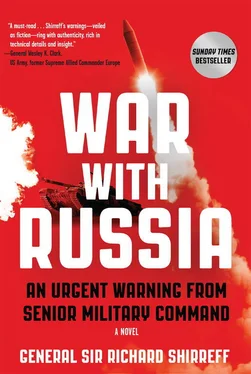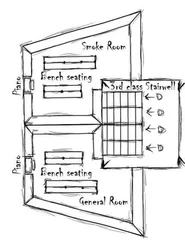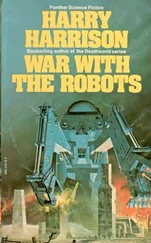Kostilek concluded with a clarion call to action. “Let me be clear. NATO has agreed Article Five and we are now at war with Russia. What I want from the North Atlantic Council today is a strong consensus that the end we are seeking is nothing less than the liberation of Estonia, Latvia and Lithuania and that you, the nations, will deliver the military means to achieve that. We must all be prepared to strain every nerve, every sinew in the fight to free the Baltic states.”
He paused to let his words sink in. Then he called upon the American ambassador to speak.
“Thank you, Secretary General. I am under instructions to pass on a direct message from the President of the United States of America to all NATO member states: the US will not abdicate from its responsibilities. Members can be assured that the US is, once again, coming to the support of Europe in its hour of need. We are in the process of deploying significant forces to Europe. The President is determined that NATO will do whatever needs to be done to expel Russia from the Baltic states. America will lead the force and provide whatever means are necessary to achieve victory. The President asks all the nations to live up to their obligations under Article Five and join us in this venture.”
Then came the challenge. “But, if necessary, we will act alone.”
The UK ambassador spoke next. Dame Flora Montrose delivered the UK’s message with her customary brevity. “The UK’s Baltic allies have been attacked and occupied. The Royal Navy has suffered unprovoked attacks on two ships, Queen Elizabeth and Padstow . Hundreds of our sailors, marines and soldiers have been killed. Britain will not stand by and watch this vicious aggression go unpunished. Britain therefore considers itself at war with Russia. Together with the United States and, we trust, all our NATO allies, Britain will do what needs to be done to re-establish peace and legitimacy in the Baltic region.”
There was a surprised murmur from the ambassadors around the table. Here, at last, was Britain stepping forward and taking a lead role in NATO—a welcome change from recent years.
The German ambassador, bulky and glowering, caught Secretary General Kostilek’s eye and was given the floor.
“Secretary General, dear colleagues. Germany’s history gives us a unique perspective and understanding of the impact of unprovoked aggression by a dictator unfettered by the need to conform to democratic institutions. What we have witnessed in the Baltic states is no different in tone from Nazi Germany’s occupation of much of Europe in the Second World War. You will all be aware that the weight of history has continued to weigh heavily on Germany, hence our reluctance to participate in certain international missions where force has been used. However, I cannot begin to express adequately the outrage and horror felt throughout my country at the sinking of FGS Eckernförde and the death of so many of its crew. This, as well as the attacks on our friends in the Baltic states and on the ships and soldiers of America and Britain, has totally changed attitudes in Germany. The Bundestag, the Constitutional Court, and the population as a whole are now overwhelmingly in favor of taking whatever action needs to be taken to expel Russia from the Baltic states. Germany stands by to play a full part in undertaking military action together, we hope, with our fellow NATO members. But without them if necessary.”
McKinlay was conscious that he was witnessing history. Germany, so long the most pacifist nation in NATO, was today sanctioning the use of force. Like so many of his senior military colleagues, he had the highest respect for the professionalism of German commanders and staff officers and the quality of its military hardware, but despaired of that country’s consistent refusal to do anything meaningful with them. Now, once again, panzers marked with black crosses would be heading east. This time it would be in the cause of freedom and not of occupation.
“That’s just what we needed to hear,” he muttered to Admiral Howard, next to him. Then he scribbled a note and gave it to his German MA, Commander Wolfgang Kretschmer of the German Navy, one of the three Military Assistants who looked after the wide span of DSACEUR’s responsibilities and who had recently joined the office.
Kretschmer read it, nodded, and left the room to fix up calls to the Chiefs of Defense Staff of Germany and the UK.
McKinlay listened while a series of ambassadors reinforced the commitment of their countries to taking whatever military action might be needed to liberate the Baltic states, although Hungary and Greece remained silent, neither promising support but no longer—and just as importantly—refusing it either. Judging the moment perfectly, Secretary General Kostilek intervened and summed up the mood of the meeting.
“Ambassadors, I congratulate you on your very positive statements. I see there is unanimity in support of taking whatever action is necessary to liberate the Baltic states. If we get this right, and there is no reason why we cannot, the future of the Alliance is safe. I had no doubt that the nations would rise to the challenge. The question now is what action can be taken. For this we are in the hands of the NATO military authorities… SACEUR, the floor is yours.”
“Thank you, Secretary General,” said Howard. “You will all be aware of the outline proposal we have circulated under strictest security to each of you. I will not repeat what is in that because it is of critical importance that the tightest operational security is maintained… and we can’t do that in open forum in the North Atlantic Council. I propose first that DSACEUR outlines the general force generation requirement so that you understand the scale of the challenge. Secondly, I recommend that we arrange a Top Secret briefing for your military representatives. They will then ensure that you understand what is planned. But, and most important, I now need your authority to proceed with the detailed planning.”
Kostilek concurred. “We all understand that secrecy is vital. Can I take it that the Council approves the proposal that the NATO military authorities take forward the planning of the operation whose outline you have been briefed upon separately?”
There was silence. “I see it does,” announced Kostilek before anyone could disagree or ask questions. “I therefore call upon DSACEUR to discuss force generation.”
McKinlay looked around the table. In contrast to the previous NACs, there was a sense of purpose and a determination he had never felt before. In its blackest hour, this historic alliance, the most successful the world had ever seen, had found the will and determination to fight back.
“Ladies and gentlemen, I will not go into detail now. Suffice it to say that I will be engaging with each of your nations to discuss the detailed force generation requirement for the operation the Secretary General has referred to. Let me leave you with one point: the operation we are planning will require forces on a scale that NATO has not considered since the days of the Cold War. Unless your nations are prepared to support it properly, it will fail. Be in no doubt that the Alliance has the capability if it has the will. As the Secretary General said earlier, with millions of men and women under arms, NATO is more than a match for anything Russia can put into the fight. My staff are now engaging with each of your nations on what we need. I ask you to convey the message to your governments, that only if they are prepared to step up to the mark will NATO achieve success in liberating the Baltic states.”
He stopped and waited for questions. There were none and shortly afterward the meeting was brought to a conclusion by Kostilek. Howard and McKinlay had their green light.
Читать дальше












